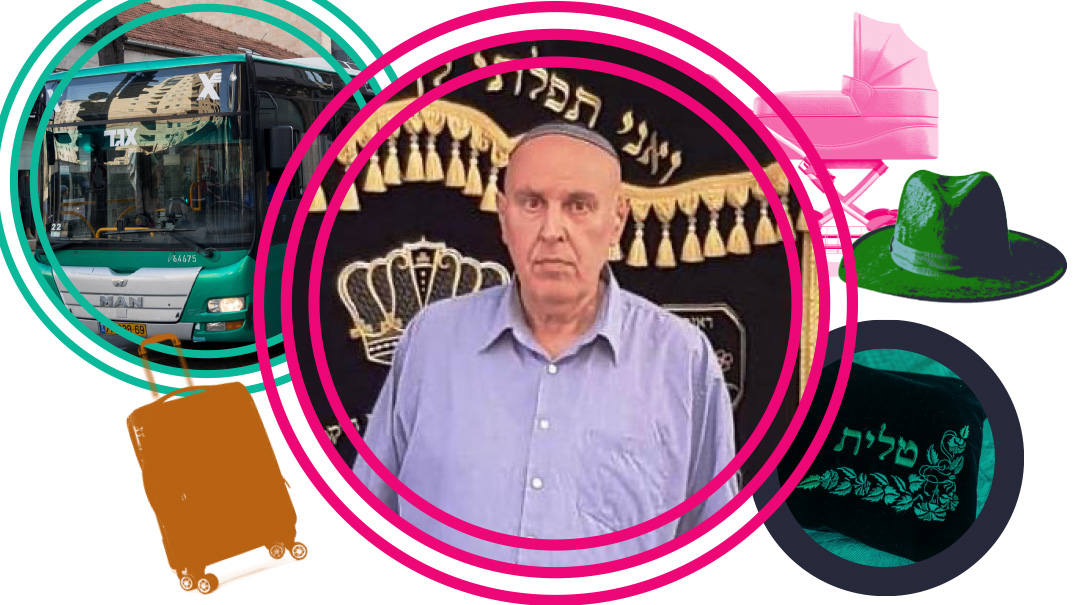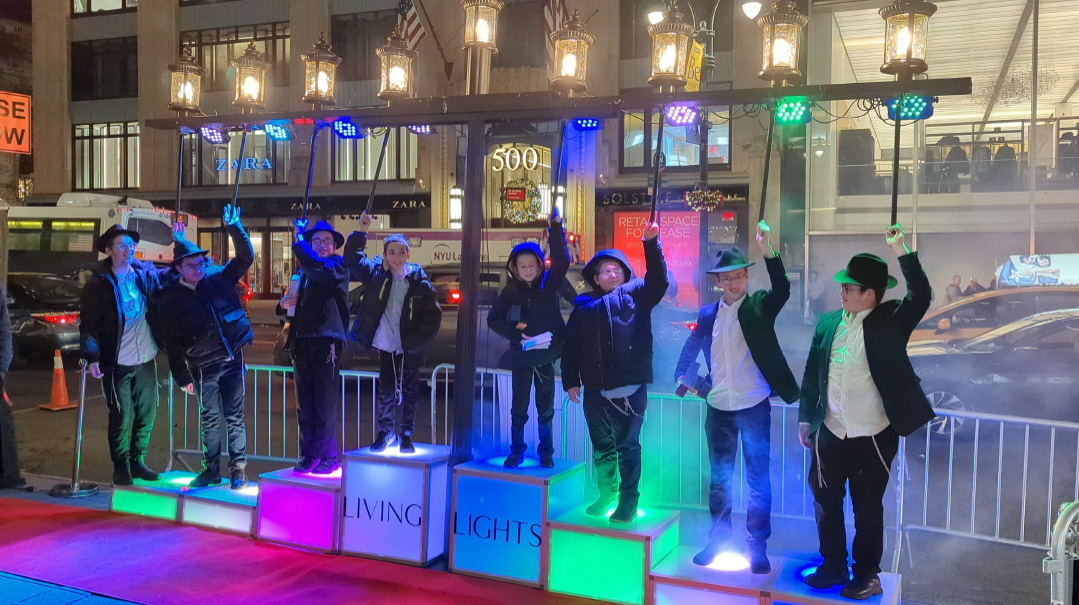Great Returns

Retired Egged employee Sossy Karako will halt traffic to return your lost item

We’ve been a nation of wanderers from the time of the Patriarchs, and we’re still constantly traveling from point A to point B. Plus, we don’t pack light. Add kids and strollers and sheitel boxes to that mix, and something is bound to get left behind. But when it’s tefillin that get lost, a huge scramble ensues. Because in the words of the great Abie Rotenberg, What a situation, where have Shnooky’s tefillin gone? He better find them soon or they might end up in Hong Kong.
Or in the case of Jerusalem travelers, doomed to reside in an Egged lost and found until the coming of Mashiach.
But not as long as Sasson “Sossy” Karako comes to the rescue. An Egged public transportation employee for 47 years, Sasson knows buses. He knows passengers. And he understands what happens when the two mix… and then something gets left behind. That’s why, over the last 12 years, he’s made returning lost items his mission, and has returned over 800 pairs of tefillin, shtreimels, sheitels, black hats, and even a memorable wedding ring.
We meet up in a coffee shop in — where else? — the Central Bus Station. From there, he’ll be going to visit his brother Moshe in Herzog Hospital for geriatric and respiratory care, just like he has every single day for the past three years when complications from Covid set in.
I arrive a few minutes late, and when we finally sit down, he tells me, “In the few minutes I’ve been waiting for you, I’ve received ten phone calls from people who need help in locating things they left on buses.”
We’re All Blind, Until…
He shows me his phone, scrolls through the numbers and messages. Some texts are peppered with pictures, tefillin bags zoomed up on the embroidered names, shtreimel boxes with labels enhanced. I turn a page in my notebook and open my mouth to ask a question, but he holds up a finger for quiet.
Oh. Okay.
He dials a number. “Shalom, this is Sossy. Did you drive the bus from Ashdod to Yerushalayim on Sunday? You did? Great, can you look for a shtreimel box? Yes, like the Ashkenazim wear. Look in the baggage compartment and above the seats. No box? Okay, I’ll call back.”
He hangs up. “A religious Member of Knesset reached out to me when his friend’s son lost his shtreimel. I told him I’ll try to find it as long as I get to borrow it.”
He laughs at his own joke, and I can’t help joining him. The Israeli Egged veteran is stereotypically crusty on the outside, with a warm heart underneath it all topped by a big kippah serugah.
But Sossy’s not finished yet. He calls the shtreimel owner back. “Hi, Nachum? This is Sossy. Where were you sitting on the bus? And where’d you put the shtreimel? And how did you pay the driver? Ah, so it wasn’t Egged. So I called the wrong driver. What’s your Rav Kav (bus card) number? Okay, I’ll call you back.” He jots down the number and hangs up.
“It’s like working for the Shabak,” I say. He nods seriously.
“It really is,” he agrees. “Except the only resources I have are my phone and HaKadosh Baruch Hu.”
The latter, I come to find out, plays a significant part in the life of Sossy Karako. Mostly, it’s a connection that has become strengthened in the last 12 years, beginning when Sossy almost lost his eyesight.
“I nearly became blind,” he relates. “I needed a cornea transplant. I underwent the surgery and it was successful, baruch Hashem, but I couldn’t go back to what I was doing for Egged, the very detailed work of schedule coordination, so they moved me to Public Inquiries. And then one day, while at work, someone wheels a suitcase over to me, telling me they just found it and are running late and asking if they can leave it with me. I don’t know if they thought I was the Lost and Found or if they wanted me to bring it to the Lost and Found, but either way, I was left with a suitcase. And using Egged’s computer systems, I managed to track down the owner.
“We say ‘Amar Rabi Binaymin’ when we lose things, and we quote the Torah’s words describing Hagar, as she was stranded in the desert, ‘Vayifkach Elokim es eineha vatelech vatimaleh es hachemes’ — really, all people are in a state of blindness until Hashem opens their eyes to see what is in front of them. I was blind and Hashem returned my sight. And when He did, I discovered this new skill set, the ability to help others find what they’ve lost.”
They Know I Won’t Quit
During Covid, Sossy’s Public Inquiry position was phased out and he retired from the Egged system, but he hasn’t been bored, between visiting his brother and his overtime lost-and-found job. He can be fielding calls as late as midnight from people who’ve lost things on buses and have despaired of finding them through the system.
“Aren’t they supposed to clear the buses after each run?” I ask.
He humphs and says that if they would do what they’re supposed to, he’d be out of the hashavas aveidah business.
“It’s also not always on buses. Someone called me, they were in Uman traveling back from Rosh Hashanah, and they found a bag with three pairs of tefillin in the duty free shop in the airport. They called me to help track down its owner. First I asked them for the contents of the bag — there was a prescription medication inside. So I called the pharmacy that prescribed it, and asked them for the legal name of the person the medicine was prescribed to. I also now had the city where the pharmacy was located. One, two, three, I found the owner, just like that.”
He says that even when “important” people who can easily get connections in Egged lose something on a bus, they don’t turn to the bus conglomerate. “They turn to me, because they know I won’t quit. With Hashem’s help, I’ve been able to find 95 percent of losses. I do it with ahavat chinam, and that is what will eventually win. I don’t have access to Egged’s systems anymore, but I do have Danny Yefet from the Holon Police and Moshe from the Ohavei Yisrael gemach in Bnei Brak.”
He shows me a letter from MK Uri Maklev, thanking him for his tireless dedication to finding lost items and wishing him well in his retirement.
“Have you seen added brachah in your life since you began all of this?” I ask. It’s a personal question, and I’m not surprised when he hesitates before giving a roundabout answer.
“My rav, Rav Shalom Shemtov from the Ohel Moed shul in the Katamon neighborhood, has always supported me and encouraged me to help every Jew when it comes to finding lost items. He says there is a shemirah over me. I feel it is always worthwhile to observe the mitzvah of hashavat aveidah and make Am Yisrael happy, and between you and me, especially the religious and chareidi sector, who honestly lose the most things.”
This Is What I Do
People know about Sossy through word of mouth, his social media page, his occasional appearances on talk shows, and service ads in newsletters around the country, like this notice that appeared in a Jerusalem neighborhood Nshei bulletin: “05-444-67877: Former Egged worker who has made it his life’s work to return lost tefillin…” (It’s worth keeping the number on file.)
Before our meeting, I’d sent Sossy an email and had received an auto reply:
If you are interested in reporting a lost item, pay attention. You must outline the loss both in an email and by filling out the attached form: “Lost or Found Report Form.”
If you have already filled out the form once, there is no need to fill out the form again.
The form is a very detailed Google form; the whole thing is amazingly professional and organized. And free.
Sossy holds up his hands in the classic “what do you think” gesture. “Of course it’s for free. This is what I do — I do it for HaKadosh Baruch Hu. But also because of my brother. That’s also really why I do this, you know. My brother, Moshe ben Farcha is his Tehillim name, had a blockage in his intestine. He went to the hospital for surgery, and shortly afterward, Covid hit. He was infected and was in a medically induced coma for over a year. For over a year, sedated and ventilated. And I knew he wasn’t in the right hospital, and I wanted to have him transferred to Herzog.”
And then the crusty Sabra, the man with the phone and the contacts and the plans, starts to cry. He puts his head in his hands, shoulders shaking.
I sit quietly, feeling small in the face of his pain.
“I turned to so many different people,” he whispers. “And no one would help.”
Eventually, he did get his brother transferred and has been visiting him every single day ever since. It’s his responsibility, as a brother, but it’s also who he is. “That strengthened my resolve with what I do,” he says, waving his phone. “I never want another person to feel helpless, to feel like there’s no one who will help them. Even while I sat at my brother’s side for those 14 months, I fielded hundreds of calls about lost items and didn’t turn a single person away.”
Lost and Found
He tells me that he was once on a bus with a chareidi family from Beit Shemesh. “They needed to transfer buses, and they asked me if I know what stop to get off at,” Sossy relates. “So I gave them the best options, and provided them with a timetable for the line they needed. They were really impressed with my knowledge, so I told them that I worked for Egged for 47 years. And their little boy, maybe eight years old, shouts, ‘Are you Sossy Karako?’
“He explained that his rebbi in cheder had recently told them a story about the koach of Tehillim: how someone lost tefillin on a bus, and he went to the Egged Lost and Found, but all he found there was disappointment. So the man said two perakim of Tehillim and Amar Rabi Binyamin, and immediately someone sent him to me. I tracked down his tefillin, and the man shared the story with his rebbi friend who shared it with his cheder class. And that’s how a little boy on a bus from Beit Shemesh knew my name.”
Sossy loves to share his stories — and as he tells them over, it’s almost like he’s reliving every one.
“Oh, this is a good one. A fellow named Moshe lost his tefillin while visiting Masada. He called up the visitor center afterward and they said, yes, they found tefillin, they asked for his address and said they’ll ship them out to him. Moshe was so excited and waited for his tefillin to arrive. But when he opened the package he realized that those were not his tefillin — they had sent him someone else’s lost tefillin instead. So what did he do? He called Sossy Karako to help him track down the owner of this pair of tefillin that were now sitting on his dining room table. And I did. The owner was a fellow named Yosef from Miami, Florida, who had lost them at Masada several years before and had long given up on them ever being returned and had purchased a new pair. But he was more than overjoyed to receive his old pair back. You see, his father had bought him that pair. And the week before his old pair arrived in the mail from me, his father passed away.”
Sossy must have told over this story dozens of times, but he still looks amazed as he repeats it yet again.
He takes out his phone and begins to read me something someone posted on a social media platform:
I am not exaggerating if I say that Sossy Karako has helped thousands of people from all denominations and circles in Israel find lost items: Tefillin, soldiers’ belongings, wallets, rings, hats, bags, suitcases, laptops, cell phones, credit cards, and much more. This week I traveled by bus from Beit Shemesh to Jerusalem, and I had an envelope with 46,000 shekels, which had apparently fallen out of my pocket and onto my seat.
I got off at the stop near the bank and suddenly realized I didn’t have the money. I almost passed out, especially since it wasn’t even my money. I started to think that maybe I forgot it at home, maybe I dropped it on the way to the bus. I called the house, they searched and they told me it wasn’t there…
I called *2800 to Egged’s Lost and Found and they directed me to the department at the Central Bus Station. I arrived there and was very visibly upset. Suddenly Sossy Karako from Public Inquiries approached me, calmed me down and invited me to come to his office where I told him the story. He immediately got on the phone, made a few calls and located the driver who left Beit Shemesh. The driver told him that he’d found the envelope, but Mr. Karako didn’t rest until the envelope reached me. May HaKadosh Baruch Hu give him the strength to continue providing help for many years to come.
Sossy clears his throat. “This is why today I’m busy trying to get the Ministry of Transportation to grant me access to their systems. This includes trains, buses, and intercity buses, and I need the widespread connections in order to help people in the way I know best.”
The Great Chase
You can send Sossy an email and fill out his chart, but if you need a really quick response, the phone is usually the fastest option, which leaves me wondering — when does he have time to field the next call if he’s busy tracking the items of the previous one? Another social media post described his split-second response time:
As I got off the Number 18 bus and saw it pull away from the bus stop, I realized that I forgot my laptop on it. My instinct was to run after the bus and try to catch it at the intersection, but I was with my little daughter on the way to her day camp, and leaving her alone while I ran for the bus wasn’t an option.
After fifteen seconds of panicked thought, it hit me: Sossy Karako. The retired Egged employee who functions as a one-man lost and found department is the legendary go-to name. It didn’t take me more than a few seconds to locate his number.
Sossy answered immediately, found out exactly where the bus was and what bus stop he was approaching, and instructed me to call the police and tell the dispatcher not to blow up my laptop in case they found it and thought it was a suspicious object.
A few minutes later I got a call back from Sossy: “You can calm down, the bag and the computer were found and are with the driver.” I relaxed a little. I hailed a cab, dropped my daughter off at her camp, and went in pursuit of the bus. Sossy gave me two options: either arrive in an hour at the Egged depot at Malha and pick up the bag when the bus finishes its run, or try to catch the bus immediately when it takes the route in the opposite direction.
I chose the latter. The driver, Yossi Mizrahi, returned my computer with kindness and a smile. “The passengers already wanted to call the police,” he said.
The Final Find
We’ve finished our coffees and it’s almost time for Sossy to go visit his brother. But before he goes, he still has one more letter to show me. “Someone sent me this as well,” he says gruffly, but he’s smiling and I can tell that whatever he’s about to show me is something that really touches him — it’s a text in the frame of a lost and found sign:
Sossy Karako, can you help us find
Our Beit Hamikdash
It has been lost from us for over 2,000 years…
I don’t know why I’m blinking back tears.
“Well, you’re definitely doing your part with that,” I say, standing up.
He nods at me gratefully, and then the finder of lost items turns to make sure he doesn’t lose his brother’s heart.
(Originally featured in Mishpacha, Issue 944)
Oops! We could not locate your form.







